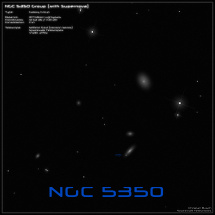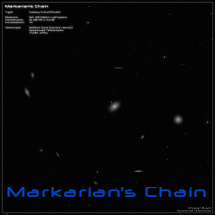
Galaxy groups are among the largest structures in the universe and refer to a conglomeration of fewer than 50 galaxies in a volume less than 5 million light-years
across. The mass of such a group is about 10 trillion suns - so they are much smaller than galaxy clusters and contain fewer galaxies, but are still among the most
numerous structures in our cosmos.
The best known example for such a galaxy group is the "Local Group", which includes our Milky Way. Here, in a volume with a diameter of about 3.5 million
light-years, a total of 35 galaxies can be found, among them the famous Andromeda Nebula and the Triangulum Galaxy, which together with our galaxy are the
three most luminous members.
Other well known galaxy groups are for example the "Maffei group" with IC 342 or the "Canes-Venatici-I group", to which among others Messier 94 belongs.












